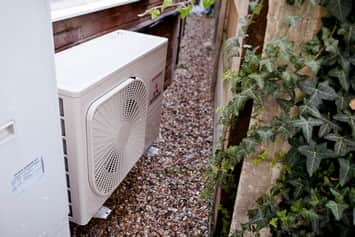If you are deciding between different types of heat pump for your home, your decision will largely depend on the layout of your property and the space you have available for installation. Air source heat pumps are often favoured for their quicker and easier installation as there is no excavation required to fit them. However, ground source heat pumps are completely concealed once installed and have lower running costs. Both systems are highly efficient, so you will want to consider the positives and negatives of each one before making a final decision.
Differences between air and ground source heat pumps
Efficiency
Because air source heat pumps work by taking in all the heat from the air and transferring it into a building, their efficiency can largely depend on the time of year and the time of day, as these factors will affect the outside temperature. In winter, more electricity will be required to heat the air as it is taken in. This is not the case with ground source heat pumps, as the temperature underground is consistent all year round. This means that your unit will not require more electricity in the colder months so will be more efficient in providing radiator or underfloor heating and hot water.
Installation
Air source heat pumps are often favoured for their simple installation, as they are fitted easily to the outside of your property. When installing a ground source heat pump, you will not need to apply for planning permission, but space will need to be made for underground pipes or boreholes. Once this has been carried out, installation of the indoor unit itself inside your home is straightforward as it is a similar size to a fridge.
Lifespan
Air source heat pumps will usually last around 10 years, due to the fact that they are outside and exposed to the elements 24/7. If you live near the coast, the sea air can cause even more of a detrimental impact, causing components to rust and the system to break down. Because ground source systems are housed inside the property, you can expect them to last around 20 years, whilst the ground array below the property could last over 100 years.
RHI income
Ground source heat pumps have the lowest running costs of any type of heating system, as they produce 4 times the energy needed to run them. They have the highest renewable heat incentive (RHI) tariff, when compared with air source or other renewable energy systems, meaning you can pay back your initial investment within around 5 years.
Carbon emissions
Both air and ground source heat pumps have become popular due to their low carbon emissions. 2020 was the first year that the UK generated more renewable electricity than through fossil fuels, so their popularity will only continue to grow. These systems will begin to take over from traditional heating and hot water methods such as gas boilers, but ground source heat pumps have lower carbon emissions due to air source pumps having to work harder to heat lower temperature air.
When it comes to efficiency and their effectiveness for heating your home, there is little to choose between both types of heat pump. Once you have decided which is more suitable for your property, you will want an installer that you can trust. Our team at JP Air Conditioning can help. As qualified renewable energy installers we can carry out both air source and ground source heat pump installation. If you would like to discuss your options with us, call now on 0208 3333 1191 or email info@jpaircon.com and we would be happy to provide our expertise.



